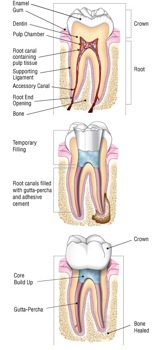
The root canals are thin channels in your tooth that run down to the tip of the tooth´s root. They carry the tooth’s nerves, veins and arteries (the pulp). Each tooth has one to four root canals.
Deep decay, a fracture or traumatic injury to the tooth allows bacteria to seep in causing an infection in the pulp and it eventually the tooth can die. When the pulp is infected it causes increased pressure inside the tooth resulting in pain,which commonly felt when biting down, chewing and from hot or cold foods and drinks.
When a tooth´s root canal is infected, the tooth will not heal by itself without treatment. The infection can result in:
The only alternative is usually extraction of the tooth. This can cause the surrounding teeth to shift crookedly and result in a bad bite. Though extraction is cheaper, the space left behind will require an implant or a bridge, which can be more expensive than Root Canal Therapy.
If the tooth has a good outlook, it might be best to keep your original tooth.
Once our dentist performs tests on the tooth and recommend a therapy, he or she can perform the treatment or refer you to an endodontist (a pulp specialist). Treatment usually involves 2 to 4 appointments.
More than 95% of Root Canal Treatments are successful.
You will be given a local anaesthetic to numb the area. Then a rubber sheet is then placed around the tooth to isolate it and keep it clean. A gap is then drilled from the crown into the pulp chamber. Any infected root canal is cleaned of all diseased pulp and reshaped. Medication is inserted into the canal/s to fight bacteria.
X-rays are also taken to determine the lengths of the canals. The crown will be sealed temporarily to guard against recontamination, or the tooth might be left open to drain the infections. Then the canals are filled to prevent bacteria from re-infecting the canal. Once filled, the tooth is permanently sealed.
As the tooth will be very weak our dentist might recommend that a gold or porcelain crown is placed over the tooth to strengthen its structure and improve its appearance. Sometimes a metal post will be required too and it is inserted above the canal filling to reinforce the tooth.
When the therapy is complete, regular follow-up exams are held to monitor tissue healing. The treated tooth can be expected to last for as long as any other natural tooth.
It is also important to brush & floss regularly, and avoid chewing hard foods on the treated tooth.
Root Canal Therapy is necessary when the pulp (the soft tissue inside your teeth containing blood vessels, nerves and connective tissue) becomes inflamed or diseased. During Root Canal Therapy, our dentist or an endodontist (a dentist who specializes in treating the insides of teeth) removes the diseased pulp. The pulp chamber and root canal(s) of the tooth are then cleaned and sealed. If the infected pulp is not removed, pain and swelling can result, and your tooth might have to be removed.
Causes of an infected pulp could include:
If you continue to care for your teeth and gums your restored tooth can last a lifetime! However, regular checkups are necessary, as a tooth without its nerve can still develop cavities or gum disease. Most of the time, Root Canal Therapy is a relatively simple procedure involving one to three visits with little or no discomfort. Best of all, it can save your tooth and your smile!